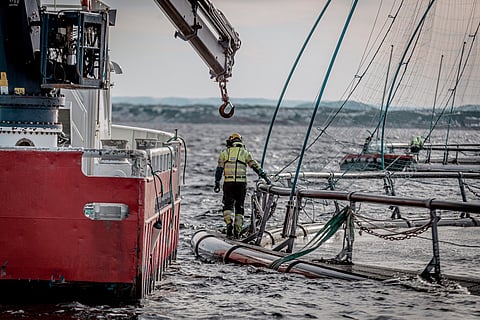

Måsøval Group has today announced its results for Q1 2023. The Group reported an operating income of NOK 237 million (EUR 20.07 million / USD 21.63 million) compared with NOK 280 million (EUR 23.71 million / USD 25.56 million) in the same quarter last year. Operating EBIT, meanwhile, was NOK 36 million (EUR 3.05 million / USD 3.28 million), less than half that of the same period last year, when it reached NOK 87 million (EUR 7.37 million / USD 7.94 million). The company has explained that the decrease in revenue is attributed to lower harvested volume, while higher feed prices were to blame for the decrease in EBIT as it "is now fully factored into the production costs".
After a record 2022, at the end of the first quarter, Måsøval records a loss after tax of NOK 31 million (EUR 2.62 million / USD 2.83 million). The reasons are mainly two: a reduction in the fair value adjustment of biomass with NOK 43 million (EUR 3.64 million / USD 3.92 million) compared to the end of 2022, and extraordinary restructuring-related costs incurred by the Group.
Sales revenue from the farming segment, the largest in the company, amounted to NOK 190 million (EUR 16.10 million / USD 17.35 million), NOK 167 million (EUR 14.14 million / USD 15.24 million) of which came from salmon sales. Although salmon prices have been higher than in Q1 2022, Måsøval's revenue decreased by NOK 64 million (EUR 5.42 million / USD 5.84 million) due to lower harvested volumes of 1,994 tons compared to 3,284 tons in the same period last year. In addition, costs were affected by higher feed prices, early harvests, lower quality due to winter ulcers, and investments in operational improvements in some of the operations.
The company maintains its forecast of 24,300 tons in 2023, 200 tons of which is expected in Q2 2023, and expects Q2 2023 costs to remain stable or decline compared to Q1 2023. Moreover, with the new co-location agreement with Frøya Laks AS – where the first harvest is expected in 2024, and fish is already put to sea on their licenses – Måsøval's license portfolio potential exceeds 39,000 tonnes.
Meanwhile, influenced by the lower harvest, revenues in the Sales & Processing segment also declined, at NOK 229 million (EUR 19.39 million / USD 20.90 million) in Q1 2023, compared with NOK 276 million (EUR 23.38 million / USD 25.20 million) in Q1 2022. Besides, operations at the Vartdal plant were partially shut down during Q1 for investments in automation, and, in line with the Group's strategy, the share of contracts remains low.
As a consequence of the application of the so-called "salmon tax" in Norway, Måsøval has already canceled or put on hold investments worth approximately NOK 1.5 billion (EUR 127.19 million / USD 137.05 million). Like most of the salmon-producing companies in Norway – for example, Mowi, Grieg Seafood, or Lerøy Seafood – the Frøya-based company has also made special mention of the salmon tax in its first quarter results presentation.
"Måsøval sees this as a special tax on aquaculture companies that today create value and employment in many small coastal societies in Norway. This will have significant negative repercussions for our suppliers and the coastal societies where we operate our business. We believe that this tax is ill-conceived and detrimental not only to the aquaculture business in Norway, but also to the future tax base for Norway".
Among the investments the company has put on hold as a result of the salmon tax is the Aqua Semi project. In 2019, Måsøval received 4 development licenses to develop this concept intended to open up new areas for salmon farming, reduce the spread of lice and disease, improve fish health, and reduce operating costs. The development phase of the project was completed during the first quarter but the Group has announced that it is halting the project "due to uncertainties about the future taxation of aquaculture".
Founded in 1973, Måsøval is an integrated producer of Atlantic salmon with more than 50 years of operational experience. Located on the coast of central Norway, in the region west of Trondheim, the company has both significant farming operations at sea and in-house smolt production. Through its majority ownership in the processing and distribution company Pure Norwegian Seafood AS, Måsøval is processing and exporting high-quality Atlantic salmon to a global marketplace. Led by the third generation of the Måsøval family, it looks forward to producing more than 30 000 tonnes of salmon a year, serving 3,1 million people – every single week, year-round.
